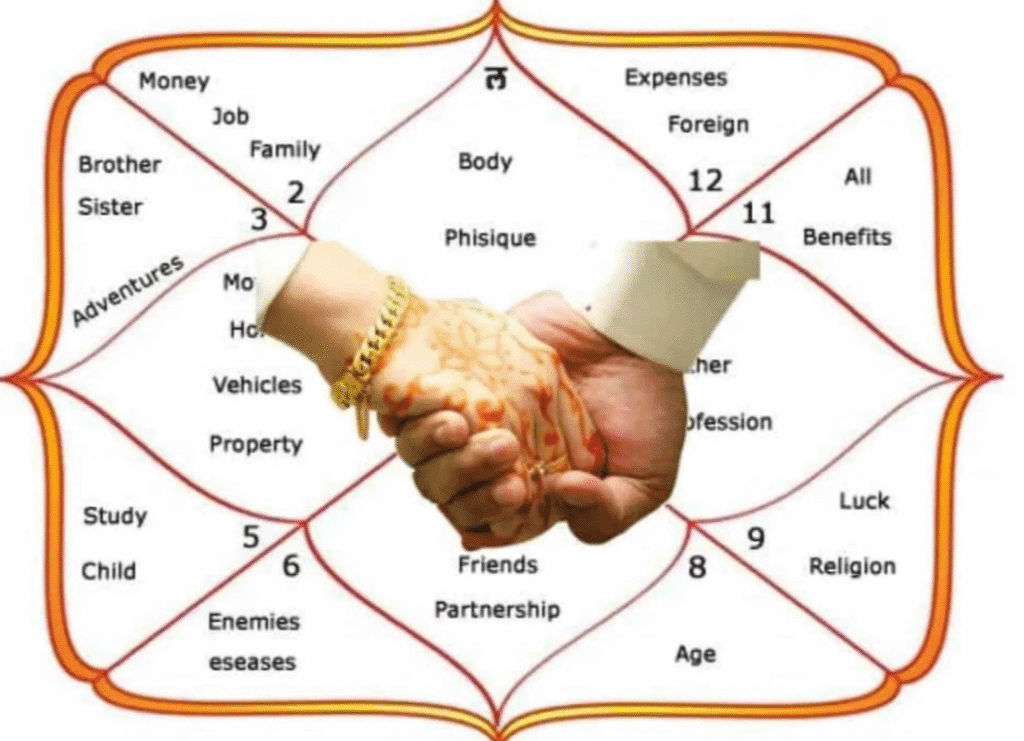What Is Kundali Matching or Gun Milan?
Kundali matching, also known as Gun Milan or Ashta Koota Milan, is a traditional Vedic astrology system used to assess marriage compatibility. Out of a total of 36 points, different aspects (kootas) of the bride and groom’s horoscopes are compared — such as mental compatibility, physical attraction, health, family support, and more.
The eight kootas are:
- Varna – spiritual compatibility
- Vashya – mutual influence
- Tara – health and well-being
- Yoni – sexual compatibility
- Graha Maitri – mental harmony
- Gana – temperament
- Bhakoot – emotional bonding & fate
- Nadi – genetic compatibility and dosha risk
According to tradition, a score above 18 is acceptable, while a score above 24 is considered good. But here’s the truth: even a high score does not guarantee a happy marriage.
When 30 Gunas Fail and 19 Succeed — A Real Story
Years ago, I matched 30 out of 36 gunas with a potential partner — a near-perfect score. But after just a few conversations, I felt nothing. There was no flow, no ease, and no sense of emotional comfort.
Later, I met someone else. Our gun milan score? Just 19. Yet during our very first conversation, we both said the same thing — “It feels like we’ve known each other forever.” That moment stayed with me. It confirmed what I now see again and again in my consultations: Kundali matching is not just about numbers. It’s about planetary alignment, timing, and emotional resonance.
Why Gun Milan Alone Is Not Enough
The Ashta Koota system was designed centuries ago. Society has changed. So have relationships. Today, marriage isn’t just about family and physical compatibility — it’s also about individual ambitions, emotional growth, and karmic alignment.
For example: a girl might be ambitious and career-driven, while the groom’s family wants a homemaker. Even with a high score, that match is set for conflict unless both horoscopes support each other’s life path.
Ashta Koota is still useful, but it is not a complete system. It doesn’t account for:
- Present and future planetary strength
- The dasha and antardasha a couple is currently running
- Karmic patterns, mental health indicators, or long-term spiritual alignment
That’s where a deeper astrological reading becomes essential.

How I Read Charts: More Than Just Matching Points
My approach to Kundali matching is rooted in classical astrology but adapted to modern relationships.
I go far beyond just counting gunas. Here’s what I analyze:
- Dasha & Antardasha periods to check if both individuals are in growth, stress, or transformation phases
- Planetary strength in key houses — especially the 7th (marriage), 5th (love), 9th (luck), and 2nd (family)
- Nakshatra compatibility for emotional and psychological behavior
- Moon & Lagna signs to understand temperament and communication style
- Doshas like Mangal or Nadi, only if they are relevant and not overhyped
💡 True compatibility is when one partner’s strength balances the other’s weakness — like two hands that hold, not pull each other down.
Real Case: When a High Score Concealed a Warning
A client once came to me to match her daughter’s chart. The gun score with the proposed groom was a solid 27 — everything looked perfect. But when I studied the groom’s chart, I saw troubling indicators: mental instability, dangerous emotional triggers, and patterns of manipulative behavior.
I warned her clearly: “Don’t go ahead.”
They didn’t listen. One year later, their daughter was back home, devastated. The marriage had ended in emotional trauma and threats of self-harm from the husband.
This is why I always say: the planets know more than the points do.
Marriage Is Like Sailing — Planets Are the Winds
A marriage is like sailing. The couple is the ship — but the planets are the winds and tides. If you don’t know the direction of the wind (your dasha and karmic timing), no matter how beautiful the ship looks (36 points!), it won’t reach the shore.
That’s where a good astrologer comes in — not to decide for you, but to help you navigate.

What People Usually Worry About (and What Actually Matters)
In my consultations, people often come panicking with these questions:
- “We have Nadi dosha — will the marriage fail?”
- “His chart has Mangal dosha — is it dangerous?”
- “It’s an intercaste match — can we still check compatibility?”
Here’s the truth:
- Doshas matter — but only when combined with weak planets and bad dashas
- Love marriages can work beautifully if the planets support emotional connection and spiritual harmony
- Scores are not the ultimate truth — I’ve seen 18-point matches thrive and 30-point matches fall apart
My Role As An Astrologer: Your Cosmic Guide
I guide you by reading your charts deeply — not superficially.
I study your:
- Planetary positions
- Nakshatra combinations
- Dasha–Antardasha cycles
- D-9 chart (Navamansha) for long-term marital harmony and the strength of the 7th house
- Strengths and vulnerabilities
- Emotional and spiritual resonance
My goal is simple: to help couples understand whether their timing, temperament, and karmic journeys support a stable, harmonious, and growth-oriented relationship.
“It’s not about matching perfection — it’s about complementing each other’s qualities and weaknesses.”

Want a Deeper Look into Your Compatibility?
If you’re tired of software-generated scores and want real answers — let’s look at your charts the way they were meant to be read. Together, we can understand:
- Whether your souls walk in the same direction
- Whether your planets support growth or resistance
- And how to strengthen the bond you already share
👉 Book a personalized Kundali Matching session with me today.
